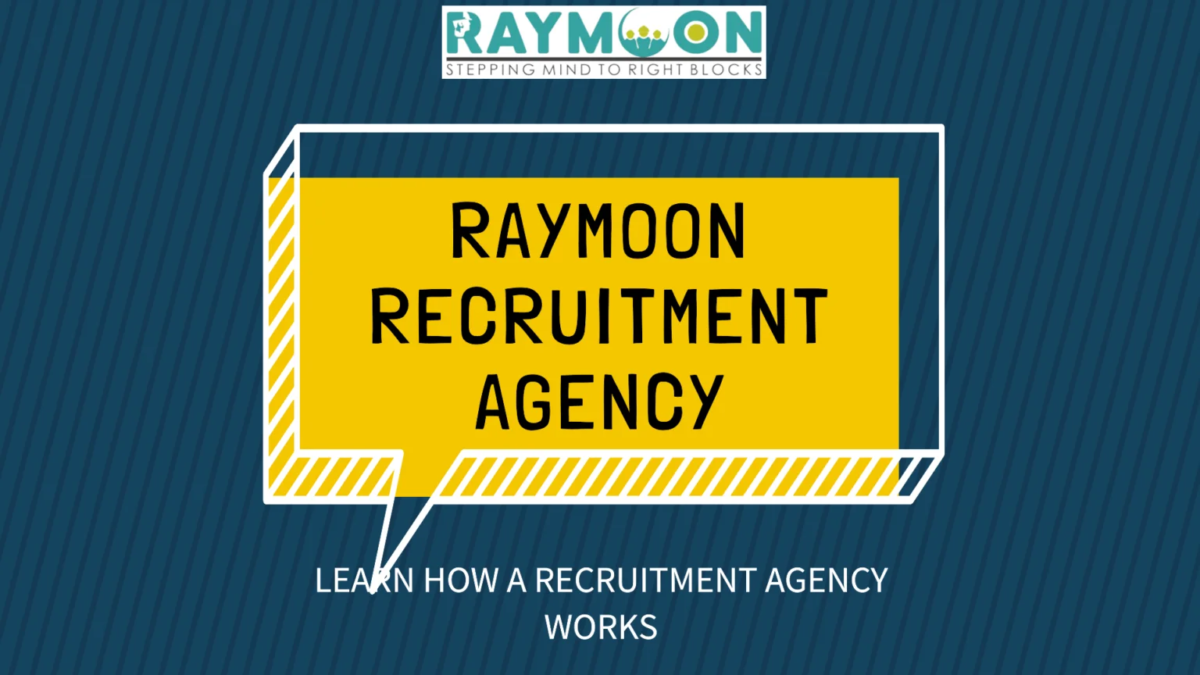
Benefit of using manpower services
December 26, 2024
Types of Recruitment Agency
December 26, 2024How Does a Recruitment Agency Work?
Recruitment agencies are playing vital role to connect employees and employers. Whether you’re a company looking to hire new employee or a job seeker aiming to land your dream job. In this article you will learn more about the operation of the recruitment agency?

What is Recruitment Agency?
A recruitment agency is also known as manpower agency, staffing agency or employment agency. Recruitment agency act as a bridge between employees and employers. The primary goal of recruitment agency to find suitable candidates according to companies requirements, while also help job seekers to find their dream job according to their skills and qualifications.
Recruitment agencies are specialised in specific domains, job roles and skill level. Agencies work according to their domain some of work in Blue collar (e.g., Warehouses, manufacturing industries, etc), while other may target White collar Professions (e.g., IT professionals, engineers, etc). Additionally, recruitment agencies offer temporary staffing, permanent hirings and more.
The role of Recruitment Agency
A recruitment agency is a partner that work behalf of employer and employees to help them finding their best fits. Let’s brief the role of a recruitment agency from both prospective:
For Employers
Companies, recruitment agencies provide a wide range of services to make hiring process efficient and effective which are follow below:
- Job Sourcing and Requirements: The recruitment agency first work with organisations to understand the job roles and responsibilities what they are looking for job role, qualifications, and experience. They ensure that the agency can match candidates who fit for both job requirements and company’s culture.
- Sourcing Talent: Once the job requirements are clear then they start working on the sourcing candidates through many platforms such as job platforms, social media, paid ads, internal database, and professional networks.
- Screening and Shortlisting: After sourcing the talent candidates screen based on their resumes, qualifications, experience and initial interviews. Perfect candidates are shortlisted and share to the organisations for the further discussion.
- Interview coordination: The agency coordinates the interview process between the company and the candidates. This includes scheduling interviews, managing communications, and providing feedback to both.
- Offer negotiation: After the employer select a candidate, recruitment agency helps to salary negotiations and help to finalize the job offer. Agency ensures that both the employer and the employee are happy with the terms.
- Post-hiring support: Agencies are also helps in post hiring support, such as onboarding assistance and regularly follow-ups to ensure a smooth transition for new hire into the company.
For Job Seekers
- Access to Hidden Job Markets: Many companies prefer to hire through recruitment agencies rather than advertising job openly.
- Interview Guidance: Recruitment Agency many times helps candidates improve their resume and give tips for successful interviews. Some agencies provide coaching sessions to prepare candidates for the specific process.
- Job Matching: Recruitment agencies help candidates to find the job according to their skills experience, and goals. Rather than applying to multiple jobs blindly recruitment agency helps them to find relevant opportunity.
- Support During the Hiring Process: Job seekers receive feedback and guidance throughout the hiring process. The agency keeps them informed about the status of their application, provides interview preparation, and helps them negotiate job offers.
- Specialized Expertise: Recruitment agencies that specialize in specific industries or job roles often have deep knowledge of the job market. They can provide valuable insights about job trends, salary expectations, and in-demand skills.
Types of Recruitment Agencies
There are various types of recruitment agencies, each serving a different purpose depending on the needs of employers and job seekers. List below type of agencies:
- Contingency Recruitment Agencies: Contingency recruitment agencies work on “no placement, no fees” basis. Contingency recruitment is only paid when they placed successfully candidates. These agencies handle a large number of job openings and candidates, and they are working with entry-level to mid-level positions.
- Retained Recruitment Agencies: Retained recruitment agencies operate under a contract where they are paid a retainer fee upfront, regardless of whether they fill the position. These agencies usually specialize in executive search and are often hired to find candidates for senior management or leadership roles. Because of the high stakes involved, retained agencies conduct thorough candidate searches and typically work on exclusive assignments.
- Temporary Staffing Agencies: Temporary staffing agencies specialize in providing short-term or temporary workers to companies. These workers may be hired to cover employee absences, seasonal workloads, or specific projects. The staffing agency remains the employer of record, and companies typically pay an hourly rate for the workers provided.
- Niche Recruitment Agencies: Niche or boutique recruitment agencies focus on specific industries or job functions, such as IT, healthcare, finance, or creative roles. Their specialized knowledge allows them to provide more targeted candidate searches and deeper insights into the job market for that particular industry.
- RPO (Recruitment Process Outsourcing) Providers: In RPO models, companies outsource the entire recruitment process to an external provider. The RPO provider takes full responsibility for managing the hiring process, from job profiling to onboarding. This service is commonly used by large corporations that require consistent, high-volume hiring.
How Does the Recruitment Process Work?
Recruitment process may vary from agency to agency, there are some common steps every agency follows:
- Understanding the Employer’s Need: Recruitment agency fully understand about the job vacancy, from the employer. This includes the job tittle, responsibilities, required qualifications, experience, and salary. Agency also ensures that companies specific requirements, such as remote work, flexibility, or skills related to new technologies.
- Creating Job Descriptions and Posting: The recruitment agency creates a compelling job description for the role they are looking for. Once approved by the employer, these job posts are shared to across relevant platforms, including job boards, social media and agency own network.
- Candidate Sourcing and Outreach:
The recruitment agency begins sourcing candidates. This is done through multiple channels:
- Internal Database: Every agency maintains their database of candidates they have interacted with in the past.
- Job Boards: Posting job openings on popular job portals like Naukri, LinkedIn, Indeed and Glassdoor.
- Social media: Using platforms like LinkedIn and Twitter to engage with active and passive employees.
- Headhunting: Agencies Constantly headhunt for senior-level roles, targeting candidates who are not actively looking for new jobs but open for a new opportunity.
- Screening and Interviewing: After receiving applications, the agency reviews the resumes and select the candidates who meet the job criteria. The next step is to conduct interviews to assess their qualifications, skills, and fit with the company’s culture. Agencies may conduct phone screenings, video interviews, or in-person interviews as part of the starting evaluation process.
6. Shortlisting and Presenting Candidates: Once candidates have been interviewed and evaluated, the recruitment agency creates a shortlist of the best candidates. These candidates are then presented to the employer, along with a detailed report on their qualifications and experience.
7. Interview Coordination and Feedback: The agency organizes interviews between the shortlisted candidates and the employer. They also gather feedback from employer or candidate after each interview and communicate it effectively. If necessary, they may assist in arranging further interview rounds or technical assessments.
8. Offer and Negotiation: Once the employer selects a candidate, the recruitment agency helps facilitate the offer process. They handle salary negotiations, benefits discussions, and any other terms of the employment contract. The goal is to ensure that both the employer and the candidate are satisfied with the terms of employment.
9. Onboarding and Post-Hiring Support: After the candidate accepts the job offer, the recruitment agency may assist with the onboarding process to ensure a smooth transition. Some agencies follow up with both the employer and the new hire after a few months to ensure everything is going well and to address any concerns.
Benefits of Using a Recruitment Agency
Recruitment agencies offer numerous advantages to both employers and job seekers:
- Time-Saving: Agencies handle the entire recruitment process, from sourcing candidates to conducting interviews, allowing employers to focus on their core business operations.
- Access to Talent Pools: Recruitment agencies have access to large networks of job seekers and passive candidates, giving employers access to a broader talent pool.
- Expertise: Agencies have specialized knowledge in recruitment, job markets, and industry trends, making them more efficient at finding suitable candidates.
- Reduced Hiring Risk: By thoroughly vetting candidates, agencies help reduce the risk of hiring mistakes or high turnover.
- Flexibility: For companies that need temporary staff or short-term contractors, recruitment agencies provide a flexible staffing solution.




